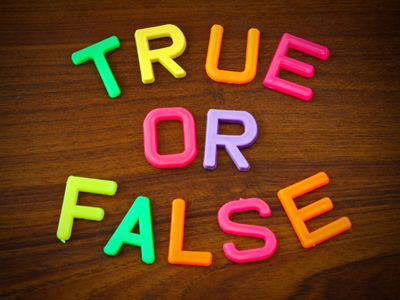
TRUE and FALSE are complementary antonyms. Something is either true or false, it cannot be in between.
Vocabulary 03 - Antonyms 3
Often in English we come across words which have a relationship with one another, such as PUSH-PULL, PRESENT-ABSENT and SINK-FLOAT. We seem to be familiar with these words and know what they represent. We also seem to think they are opposites of one another. In fact, they are antonyms of one another.
These types of antonyms come under the category of complementary antonyms. Complementary antonyms have either one or the other possibility. Whenever you use these words you always think of them as complementary in an opposite sense. Before/after, dead/alive and true/false are other examples of complementary antonyms.
These types of antonyms come under the category of complementary antonyms. Complementary antonyms have either one or the other possibility. Whenever you use these words you always think of them as complementary in an opposite sense. Before/after, dead/alive and true/false are other examples of complementary antonyms.
1 .
"The suddenness with which the arrests were made has provoked CONSTERNATION among large sections of the citizens." - Choose the antonym of the word in capitals.
Tranquillity
Alarm
Fright
Dread
The other options are synonyms of CONSTERNATION. Some more antonyms of CONSTERNATION are 'composure' and 'calmness'
2 .
"The discredited minister's dubious actions have brought REPROACH to the entire government and the party." - Choose the antonym of the word in capitals.
Commendation
Censure
Blame
Condemnation
The other options are synonyms of REPROACH. Some more antonyms of REPROACH are 'honour' and 'respect'
3 .
"If you continue with your anti-party activities we have to OSTRACISE you." - Choose the antonym of the word in capitals.
Include
Exclude
Debar
Expel
The other options are synonyms of OSTRACISE. Some more antonyms of OSTRACISE are 'welcome' and 'permit'
4 .
"The company does not take feedback well and if it does not take corrective steps soon the public will PATRONISE its competitors' products." - Choose the antonym of the word in capitals.
Indulge
Antagonise
Favour
Support
The other options are synonyms of PATRONISE. Some more antonyms of PATRONISE are 'ignore' and 'boycott'
5 .
"The trade union leader was CASTIGATED and demeaned by the HRD chief for his illegal stand." - Choose the antonym of the word in capitals.
Censured
Praised
Berated
Reprimanded
The other options are synonyms of CASTIGATED. Some more antonyms of CASTIGATED are 'heralded' and 'lauded'
6 .
"The police introduced more witnesses' testimonies to CORROBORATE the evidence provided by the star witness." - Choose the antonym of the word in capitals.
Substantiate
Justify
Contravene
Confirm
The other options are synonyms of CORROBORATE. Some more antonyms of CORROBORATE are 'disprove' and 'invalidate'
7 .
"Despite the overtures of the trouble shooters the DISSONANCE among different sections of the party continued." - Choose the antonym of the word in capitals.
Dissension
Discord
Disparity
Harmony
The other options are synonyms of DISSONANCE. Some more antonyms of DISSONANCE are 'agreement' and 'concord'
8 .
"The Congress party could not stem the EXODUS from the party of its key members." - Choose the antonym of the word in capitals.
Flight
Withdrawal
Departure
Influx
The other options are synonyms of EXODUS. Some more antonyms of EXODUS are 'arrival' and 'entry'
9 .
"The anchor of the TV debate did not allow the spokesperson to OBFUSCATE his viewers by avoiding the pointed questions." - Choose the antonym of the word in capitals.
Stupefy
Bewilder
Confuse
Clarify
The other options are synonyms of OBFUSCATE. Some more antonyms of OBFUSCATE are 'explain' and 'enlighten'
10 .
"The IPL team's owner is yet to be EXONERATED from the accusation of spot fixing." - Choose the antonym of the word in capitals.
Absolved
Acquitted
Convicted
Vindicated
The other options are synonyms of EXONERATED. Some more antonyms of EXONERATED are 'charged' and 'blamed'
**Unlimited Quizzes Await You! 🚀**
Hey there, quiz champ! 🌟 You've already tackled today's free questions.
Ready for more?
Ready for more?
🔓 Unlock UNLIMITED Quizzes and challenge yourself every day. But that's
not all...
not all...
🔥 As a Subscriber you can join our thrilling "Daily Streak" against other
quizzers. Try to win a coveted spot on our Hall of Fame Page.
quizzers. Try to win a coveted spot on our Hall of Fame Page.
Don't miss out! Join us now and keep the fun rolling. 🎉
**Unlimited Quizzes Await You! 🚀**
Hey there, quiz champ! 🌟 You've already tackled today's free questions. Ready for more?
🔓 Unlock UNLIMITED Quizzes and challenge yourself every day. But that's not all...
🔥 As a Subscriber you can join our thrilling "Daily Streak" against other quizzers. Try to win a coveted spot on our Hall of Fame Page.
Don't miss out! Join us now and keep the fun rolling. 🎉







